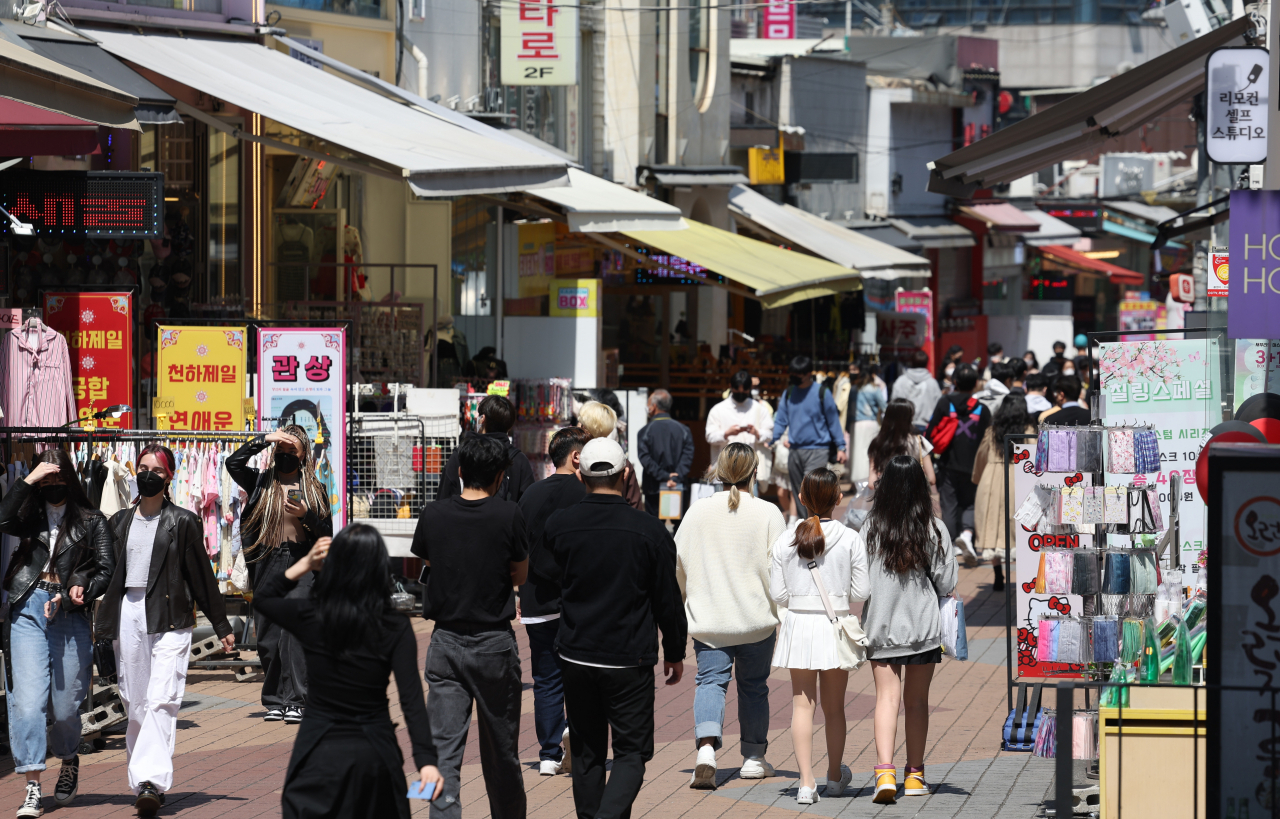S. Korea to lift COVID-19 social distancing rules after 2-year fight against virus
By YonhapPublished : April 17, 2022 - 09:57

After battling the new coronavirus for two years, South Korea is moving closer to post-pandemic life with the planned lifting of almost all COVID-19 social distancing rules.
The new "post-omicron" scheme marks the first sweeping change in the COVID-19 response system since South Korea reported the first outbreak of the novel virus on Jan. 20, 2020.
Starting Monday, restaurants, cafes and many other business establishments will be able to operate freely without a curfew and people will be allowed to gather in large groups with no limit in size.
The mask mandate is the only rule that will remain in place for now.
The seven-day mandatory quarantine for COVID-19 patients will be fully lifted in late May and at-home treatment will no longer be required.
People also will be able to be diagnosed and treated for COVID-19 at local clinics and hospitals, as with treatment for flu.
The relaxation also comes with the removal of a 299-person cap on large-scale events and rallies, as well as the 70 percent capacity cap on houses of worship. Eating inside movie theaters, indoor gyms and religious facilities will be allowed starting April 25.
The lifting of social distancing rules demonstrates Seoul's efforts to restore the daily lives for people long beset by the pandemic and help businesses, especially small merchants and self-employed, recover from the economic and financial hardships.
"We will be able to start again on the road to a phased return to normal," Prime Minister Kim Boo-kyum said during a government response meeting on Friday.
"Preventive efforts are still important ... even as the government pushes for a return to normal, we will prepare thoroughly under the assumption that the risk can return," Kim said.
Health officials have signaled an all-out change in the virus response scheme, concluding that the virus wave passed its peak and is on track for a steady decline in the coming weeks.
The daily COVID-19 cases have been falling after hitting the record high of more than 620,000 on March 17 at the height of the omicron spread, according to the Korea Disease Control and Prevention Agency (KDCA).
More than 30 percent of the 52 million population have had COVID-19.
The new scheme comes ahead of a planned downgrade of the COVID-19 infectious disease level by one notch to Class 2 from Class 1, the highest in the four-tier system. A tentative four-week "transition period" will be applied before the actual implementation to allow the new system to sink in.
COVID-19 is currently rated the same as diseases such as the Ebola virus and the Middle East respiratory syndrome.
The downgrade of the classification level is primarily aimed at allowing patients to receive treatment at local clinics and hospitals, like an endemic disease, so that the medical system can be normalized for general operations and focus on severe COVID-19 cases.
The protracted COVID-19-driven overload has taken its toll on the country's entire medical system, prompting calls on the government to improve the situation.
Once the transition period ends, all medical systems will return to normal operations, as the downgrade means the authorities no longer have to oblige patients to quarantine or be admitted to a general hospital, nor do they have to constantly keep track of the patients' health status.
On international travel, all inbound vaccinated people will be exempt from the seven-day quarantine and they will only need to submit negative polymerase chain reaction (PCR) test results upon their arrival and 48 hours before the departure.
The government is also considering gradually expanding the visa-free entry for countries that do not have the mutual visa waiver program with South Korea.
It also plans to revive the use of international flights by 50 percent within this year by lifting the limit on the number of arrivals per hour at Incheon International Airport, west of Seoul, and resuming international flights at regional airports.
South Korea first introduced social distancing measures in March 2020, about two months after the initial outbreak.
The measures started off with recommendation to suspend operations at religious facilities and select businesses, as the country experienced a series of cluster outbreaks at churches and among large religious gatherings in regional provinces.
The social distancing rules got tougher as the virus spread exacerbated, with the government imposing a five-person limit on private gatherings nationwide in January 2021 to rein in the spike in infections.
At one point, the restrictions were tightened to only allow two people to meet at night and only allow takeout at cafes.
Under a "phased return to normal" scheme, the government had relaxed distancing rules last November but later rolled them back as the country was gripped by the rapid spread of the highly transmissible omicron variant.
Despite the swift relaxation, health officials stressed that the lifting of social distancing rules should not be regarded as the "end of the coronavirus," but as full-fledged attempts to get everyday life back.
"This system transition is not a simple adjustment of infectious disease level or easing of quarantine measures, but a new start and a very difficult challenge to safely resume daily life and establish a routine treatment system with COVID-19," KDCA Commissioner Jeong Eun-kyeong said earlier. (Yonhap)






![[KH Explains] How should Korea adjust its trade defenses against Chinese EVs?](http://res.heraldm.com/phpwas/restmb_idxmake.php?idx=644&simg=/content/image/2024/04/15/20240415050562_0.jpg&u=20240415144419)












![[Today’s K-pop] Stray Kids to return soon: report](http://res.heraldm.com/phpwas/restmb_idxmake.php?idx=642&simg=/content/image/2024/04/16/20240416050713_0.jpg&u=)